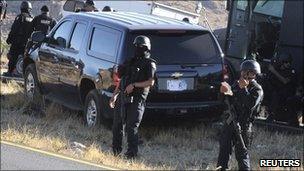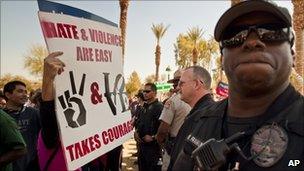US-Mexico talks: Key issues facing Obama and Calderon
- Published
Mexican President Felipe Calderon is in the US for talks as a number of controversies take a toll on what had been steadily improving US-Mexico relations. Here are some of the main issues on the agenda during Mr Calderon's visit.
Drug wars

The trip comes against a grim backdrop. Last month a US official was murdered in Mexico
The backdrop to this visit could not be grimmer. Last month's fatal shooting of Special Agent Jaime Zapata in San Luis Potosi was the first murder of an American official in Mexico in 26 years - placing further strain on an already tense bilateral relationship. The Mexican authorities quickly blamed Los Zetas, a feared drugs cartel, and have detained a number of suspects. Washington will expect justice to be delivered swiftly, but there is also an uncomfortable recognition here that US guns and demand for drugs are driving the deadly trade.
Mexico says a significant number of weapons used by the drug cartels were bought in the US and smuggled over the border. A weapon allegedly used in the shooting of Agent Zapata has been traced back to a gun store in Dallas, Texas. The Mexican government has already succeeded in getting Mr Obama to acknowledge that the US also has a share of responsibility in the crackdown on criminals south of the border.
"Both countries have to do more at all levels in their own territories," the foreign affairs under-secretary Julian Ventura told the BBC. "There are some limitations and the current co-operation is not sufficient, that's why we are working together now," he said.
Mexico is also lobbying for stronger measures to stem money laundering and it is possible that Mr Calderon may also ask the US authorities to do more to reduce the US consumption of drugs, as America is still the main market for Mexican cartels.
Wikileaks
Relations had deteriorated even before the fatal shooting of Mr Zapata, courtesy of state department cables released by Wikileaks. Documents signed by the American ambassador to Mexico, Carlos Pascual, painted an unflattering American portrait of the Mexican security forces, external, and questioned whether President Calderon could win his war on drugs.
Correspondents say they were an embarrassing contrast with Washington's public backing of a neighbour under pressure. Mr Calderon's response at the time was furious. The cables "have done a lot of damage with the stories they tell that are, in truth, distorted", he said, particularly objecting to cables talking about a lack of co-ordination among Mexican agencies.
"I do not have to tell the US ambassador how many times I meet with my security cabinet, it is none of his business. I will not accept or tolerate any type of intervention," Mr Calderon added.
Immigration

State and national moves on immigration have raised concerns outside the US
Barack Obama's campaign pledge of comprehensive immigration reform is now firmly on the back burner. Healthcare was a higher priority when Democrats enjoyed full control of Congress; and with Republicans now holding sway in the lower house, the scope for meaningful legislation is limited.
President Calderon expected more from his American partners - in an address to Congress last year he derided Arizona's controversial state immigration law as a "terrible idea", and urged lawmakers to act at a federal level. Now, at best, the Mexican side will have to hope that Barack Obama returns to the issue if he is re-elected.
Mexican authorities are also concerned about some immigration legislative projects under way in several US states, among them Arizona, New Mexico and Florida. Mr Ventura warned that local and state legislation was "having an impact on our fellow compatriots and the immigrant community there". They are especially alarmed about proposals aiming to deny citizenship to children of undocumented migrants born in the United States.
Mexico's Senate has urged Mr Calderon to "express emphatically and categorically" Mexico's opposition to such measures. Many Mexicans fear an impact on the national economy from any anti-immigration moves in the US. Remittances from Mexicans abroad are the second largest source of income, after oil and ahead of tourism.
Trade
This will not be a headline issue, given the more pressing concerns about drug violence. But officials from both sides hope to make headway in a long-running dispute over cross-border trucking. In 2009, citing safety fears, President Obama cancelled a programme allowing Mexican trucks to carry cargo into the US. Mexico denounced the move as protectionist, and responded with tariffs on targeted American goods. Now, Washington has attempted to break the impasse by putting forward a "concept document" of proposed solutions.
Mexico also wants to remind Mr Obama that it is a growing economy - which expanded by 5.5% in 2010. The government boasts that foreign companies have invested $80bn in the country in the last four years alone. The American company Walmart recently announced an investment of more than $1.57bn in 2011. President Calderon wants other firms to follow that path and will meet chief executives and investors on his two-day trip to Washington.
The BBC's Steve Kingstone in Washington and Ignacio de los Reyes in Mexico City contributed to this report.